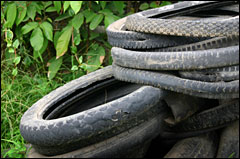Dear Umbra,
Is there such a thing as recycled bicycle tires? I have looked and even asked a friend’s husband who wrenches in a local shop. He was not aware of any. I think because people ride their bike they automatically assume they are Earth-“friendlier” than others. But I go through two sets of tires a year (more due to road conditions than my riding style). While it is not a lot, they are still petroleum-based materials. So is there such thing as a “green” tire?
Joe Marquez
Seattle, Wash.
Dearest Joe,
Bicycles are, as you note, so inherently Earth-lovin’ that I get hardly any questions about them, which in turn makes it hard to draw attention away from cars and toward the bicycle. I invite more bicycle questions, even if they’re related to inhaling car exhaust.

If only this were everybody’s problem.
Photo: iStockphoto
Common bicycle tires, the type with an outer shell that sits upon the wheel rim, have three basic parts: the U of woven, mostly nylon fabric; the steel wire “beads” that contact the rim; and the rubber treads atop the U. Rubber treads contain various mixtures of synthetic and natural rubbers, carbon black, additives, and softeners or hardeners, colorants, etc. Proprietary mixtures, I assume, since if a tire manufacturer can’t claim uniqueness for each tire — e.g., “It’s [sic] High Density Vectran Guard uses a patented weaving technology” — how would it make money?
The inner tube that fits inside a basic tire is now almost always made from butyl rubber, a synthetic rubber that is highly impervious to gas transmission. That is, it holds air well, and that is why it dominates the market and poor old latex rubber, made from tree sap and 10 times less air-embracing, languishes in a corner waiting for someone to notice it. Latex rubber tubes are available, and are said to have some nice performance advantages such as suppleness while cornering, as well as coming from a renewable resource. These benefits are countered by their higher price and how often you would need to inflate your tubes — widely reported as a major hassle of latex. (Latex seems to be the maple syrup of the rubber tree, and if you wish to harvest your own, I found you some instructions.)
You were hoping for recycled bicycle tires — I think you mean tires with recycled content. I suppose it might be possible to use recycled steel wire in tire rims, or recycled-content nylon mesh in the fabric, but I came across no manufacturers claiming to do this. Rubber itself is recyclable, but vulcanized rubber — rubber that has been treated to stay hard longer — degrades in the recycling process. It cannot be turned back into bike tires, rather it becomes playground mats or drip tubing. I did come across a purportedly green polyurethane tire, with highlights including longer wear, no need for a tube, a low-toxin manufacturing process, and recyclability — but another source deflated the hype, revealing that lower shock absorption on these poly tires can cause the wheel rim to jar loose and suddenly collapse.
I’m a cyclist but I’ve never been a gear head, so what did I know about tires, right? Until you asked, and I looked around, and according to gear heads on the web, there’s a big variety of tires out there, and each has its own special properties and purpose. Finer tire appreciation is not only for racing cyclists. The point being, and my suggestion for you being: go forth and find ye a gear head, perhaps your friend who wrenches, who can fit you with tires that will last longer than six months under your riding conditions.
Props to you, of course, for riding so diligently as to wear out four tires a year, but I refuse to believe that all these years of tire technology can’t handle the basics of riding on hard terrain. If punctures are an additional trouble and cause of tube waste, some tires are more puncture-resistant than others, and there are also little strips of rubber sold as puncture-resistant tire inserts. In terms of recycling your dead tires and tubes, ask at your shop or in your local bike club if they will accept them and send them on to be reclaimed with car tires, or if they know where to send them nearby.
Airily,
Umbra


